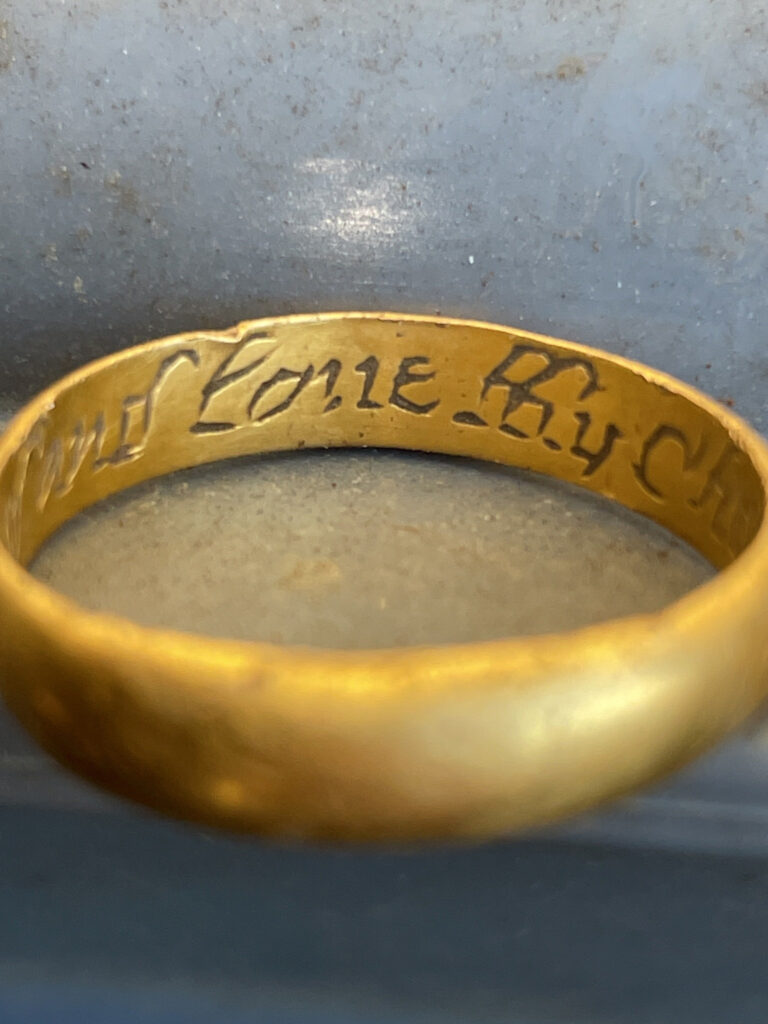A NOVICE treasure hunter couldn’t believe his luck after unearthing a 250-year-old gold ring – which bears an uncanny resemblance to the one seen in Lord of the Rings.
Simon Patron was out with his detector in a field in Canterbury, Kent on Wednesday when he quite literally struck gold.
The 43-year-old was out for the second time on the plot of land when he dug up the simple golden band, which features an etched inscription on the inside.

The inscription is believed to be in Old English, and eerily reads ‘Feare God and love thy choice’, which essentially translates to ‘Fear God and love your spouse’.
The jagged, flowing style of the inscription is heavily reminiscent of the Elvish script seen on the One Ring from J.R.R. Tolkien’s Lord of the Rings series.
The One Ring was first seen in 1937’s The Hobbit as a magic ring forged by Dark Lord Sauron in an effort to control the inhabitants of Middle-Earth.
Whilst Simon was left delighted, describing it as the “best thing he’s ever found”, some have cracked jokes of the dangers of putting the ring on.
Simon posted the find to social media on Wednesday writing: “New permit, second time on it, third hole and boom there it is.”
His post received over 285 likes with dozens of comments from excited metal detecting enthusiasts with some quick to make the connection to the infamous Lord of the Rings jewellery.
One said: “Take it to Mordor and throw it into Sauron’s volcano, do not put it on.”
Another joked: “It reads and I’m pretty sure on this one – ‘One ring to rule them all, one ring to find them, one ring to bring them all and in the darkness bind them.'”
A third replied: “This will be one for the FLO, get it registered and they will then find out everything about the ring and let you know if it’s a treasure trove or not.”
Another responded: “That my friend is a medieval posy ring.”
A fifth retorted: “Lovely posy ring that.”
The landscape gardener was left intrigued by his find and now wonders who the ring might have belonged to.
Simon believes that the small ring could belong to a woman due to the size or indeed a man who worked on the field with small hands.
The farmer who owns the land weighed the ring, which is a full five grams of gold and bears a resemblance to a collection of rings which are in the British Museum dating back to 1755.
Speaking today, Simon said: “One of my hobbies is metal detecting and I just went out on one of the farms nearby and found the ring.
“I was intrigued, I like finding out information about things and I am a very curious person.
“My first thoughts were this isn’t English writing and it’s definitely not another European language, I thought it might be Welsh but I don’t think so.
“At first I didn’t realise how old it might be, I don’t think it’s a mystery that it was lost by someone who worked in that field but my guess is that it is a lady due to size.
“Otherwise it would be a man with small fingers, it is definitely gold and I knew that the moment I saw it in the ground.
“My dream as a detectorist is to have an object found by me displayed in the British Museum, ideally with my surname next to it.
“I think by the looks of the ring it might need to be classified as treasure.
“I am so chuffed and just want to know more about the ring.”
The ring is believed to be at least 250 years old if not older based on the language.
It is most likely a posy ring, a type of ring popular from the late medieval period onwards, which were primarily used to communicate secret messages of love between the giver and the recipient.